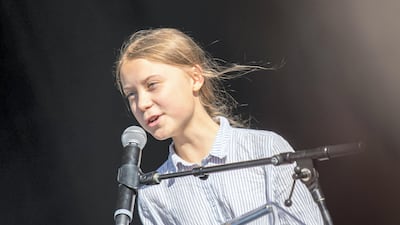Environmental activist Greta Thunberg has accused the UK of “creative carbon accounting” and said the country must stop promoting itself as a green leader.
She said Prime Minister Boris Johnson's claim that the UK is a leader for climate change action is a lie based on greenwashed figures.
She was speaking as Unicef published a report which found that about 1 billion children are in places classified as being at “extremely high risk” from climate change.
The UK is hosting the Cop26 climate conference in November. Earlier this year Mr Johnson said the UK was able to “reduce its CO2 emissions by about 42 per cent on 1990 levels”.
Ms Thunberg, 18, challenged Mr Johnson and the country’s accounting on Friday, on the third anniversary of her “Fridays for Future” school strike that saw her catapulted from Swedish schoolgirl to international leader, fighting for action on climate change.
“There’s a lie that the UK is a climate leader and that they have reduced their climate emissions by 40-44 per cent.
“Of course, if you don’t include all emissions, statistics are going to look much nicer. But if you include things like include aviation, shipping, outsourcing and the imports of consumption and burning of biomass it does not look that good.
“So I am really hoping we will stop referring to the UK as a climate leader because if you look at the reality, that is simply not true.
“They are very good at creative carbon accounting. I must give them that but that doesn’t mean much in practice.”
The Unicef index, published on Friday, found that around 1 billion children in 33 mostly African low-emission countries faced a “deadly combination” of extreme weather and existing issues like poverty, making them uniquely vulnerable.
It also found that almost all the world's 2.2 billion children are exposed to at least one climate or environmental risk, from catastrophic floods to toxic air.
Last week a UN climate panel of the world's top atmospheric scientists warned that global warming is dangerously close to spiralling out of control, with deadly heatwaves, hurricanes and other extreme events likely to keep getting worse.
Ms Thunberg said the Unicef index confirmed children would be the worst affected, and when world leaders meet in Glasgow in November for Cop26 they needed to act rather than just talk.
“I don't expect them to do that, but I would be more than happy if they could prove me wrong,” she said.
Other young activists supported the Unicef findings, including Mitzi Jonelle Tan, 23, from the Philippines, who spoke of doing homework by candlelight as typhoons raged outside, or fearing drowning in her bed as floodwaters filled her room.
After months of extreme weather and dire warnings from scientists, world leaders' “empty promises and vague plans” were no longer enough, Ms Tan said.
“There's no excuse for this Cop26 … to not be the one that changes things.”








